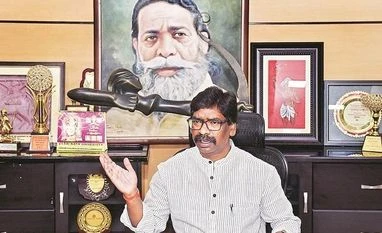To tackle the third wave of the pandemic, Jharkhand has chalked out a multi-pronged strategy that includes stepping up tests to 80,000 a day and intensifying the vaccination drive, besides augmenting the health infrastructure, Chief Minister Hemant Soren said on Thursday.
Speaking at the meeting between Prime Minister Narendra Modi and chief ministers, Soren said half the state's eligible population has been fully vaccinated.
"All necessary and concrete steps are being taken to control the third wave. Due to backwardness and complex geographical area, the vaccination drive in Jharkhand has faced some challenges. But, by making a better strategy the vaccination pace has been expedited," he said at the meeting.
"So far 80 per cent of the (eligible) people in the state have got the first dose, the number of people who have taken the second dose is 50 per cent," he added.
Besides, about 22 per cent of those in the 15-18 age group have taken the first dose and 150 vaccination vehicles have been started to speed up the drive, Soren said.
Assuring that the vaccination target will be achieved soon, the chief minister said that so far 30,000 booster doses have been administered in the state.
Also Read
"Now the state is conducting 80,000 COVID tests a day as compared to testing of 30-35,000 samples earlier. State-of-the-art Cobas machines are being used along with RTPCR in many districts for testing. Arrangements have been made for better treatment with continuous monitoring of the infected living in home isolation," he said.
Soren claimed that despite the increase in cases there was no panic among the people due to the steps taken by his government.
Since December 25, 34 people have died in Jharkhand and of them, 24 were above 60 years, he said, adding that the others were suffering from comorbidities.
The number of COVID beds has been increased to 25,000 and oxygen plants have been installed at the block level, the chief minister said.
Oxygen concentrators are also available in sufficient quantity, he added.
PM Modi asked chief ministers to ensure minimum damage to the livelihood of common people and economic activities as they work to contain the coronavirus, while noting that its omicron variant is infecting people many times faster than earlier variants.
(Only the headline and picture of this report may have been reworked by the Business Standard staff; the rest of the content is auto-generated from a syndicated feed.)
)